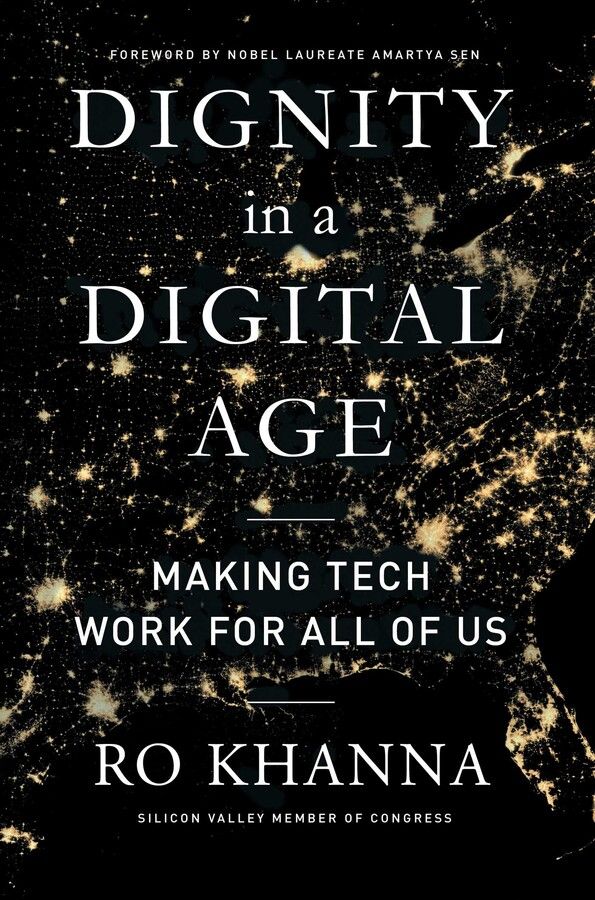Review: Dignity in a Digital Age by Ro Khanna
Daniel Napsha / Feb 1, 2022Conversations about technology inevitably provoke questions about what individuals and societies value and the extent to which technology will redefine those values– namely privacy and safety, equity and accessibility, connection and community.
In a new book, Dignity in a Digital Age: Making Tech Work for All of Us, Congressman Ro Khanna (D-CA17), whose district includes Silicon Valley, raises the importance of another one: dignity. The digital revolution has changed what individuals need to live with value. For Khanna, fulfilling that goal requires an expansion and distribution of the wealth that technology has created, as well as using technology to advance democratic ends and serve democratic citizenship. The tech policy community should welcome the book for its unique perspective and animative ideas, as well as its author’s proximity to power. Khanna clearly cares about the topic, and he has offered an inspiring contribution to the conversation.

By Ro Khanna; foreword by Amartya Sen. Simon & Schuster
Khanna’s life emulates the American Dream: born in the U.S. to Indian immigrants; raised in suburban Bucks County, Pennsylvania; educated at the University of Chicago and then Yale Law School. He served as deputy assistant secretary of the Department of Commerce in the Obama administration, ran for Congress twice and lost both races, then tried again and prevailed in 2016. Khanna understands that the conditions that made it possible for him to achieve the Dream have almost evaporated, and he is determined to correct the course.
In the first half of his book, Khanna centers the people and places that the digital revolution left behind. The Congressman specifically wants to bring more wealth-creating opportunities to rural towns and Black and Brown communities. He believes that no one should have to move to Silicon Valley or an East Coast city to participate in and benefit from the digital economy. That admirable commitment to place extends to local economic culture. This is not a call to bring Google to Nebraska. Instead, Khanna envisions a Black Tech Street in Tulsa, Oklahoma; digital grant colleges in every state; and cutting-edge technology powering agriculture systems nationwide.
Moreover, Khanna recognizes that economic participation relies on policies that encourage work and innovation. He offers the usual progressive policies as a solution, including Medicare for All, universal higher education, and early childhood education. The agenda is familiar, but his argument recalls its original purpose when situated within the discussion of dignity. Widening the safety net makes it possible for citizens to not only live with dignity, but pursue freedom—and here, he draws from the Nobel Prize winning economist Amartya Sen and eminent philosopher Martha Nussbaum.
The ideas in the book may not strike progressive readers as new, but the philosophical argument may spark genuine intrigue amongst wonks. Critics on the left and the right will notice Khanna’s repeated concern for the ill perception of tech in disaffected communities. Given the breadth of political problems to which tech has contributed, by the end of the book it is clear that the disaffected encompasses all of us. But his concern seems to miss the point; image is not the problem.
The Congressman gets more innovative in the second part of the book, on democratic citizenship in the digital age. In 2018, Khanna led the development of the Internet Bill of Rights, a set of principles to guide legislation on consumer internet use. While he elaborates on the framework, his ideas for governing the digital public sphere receive greater attention and compose the most interesting passages of the book. Khanna shares discontent with the current state of the digital public sphere and the domination of social media platforms that foster sensationalism, disordered information, and interpersonal mistreatment. In its place, Khanna envisions private and public platforms that encourage deliberation between diverse communities by design.
Khanna’s vision deserves critical appraisal beyond the permits of a general review, especially in light of recent scholarly work, long-term initiatives, and collective projects related to the subject. Khanna and others owe much to German philosopher Jürgen Habermas, who pioneered studies into the public sphere and receives attribution in the book. Habermas argued that deliberation generates higher-quality public opinion, which, in turn, informs the decision-making that governs a democracy. Better public opinion ultimately strengthens democratic states. Khanna endorses that theory, adding that technology ideally makes deliberative democracy possible.
New platforms would ideally enable and empower more citizens to participate in the governance of domestic issues and foreign policy. Bad speech—gossip, harassment, lies—currently overwhelm social media platforms, making it difficult for good actors to effectively participate in online discourse. On the question of acceptable online speech, Khanna suggests another law that would require platforms to take down any speech where there is a court order that a particular post incites, threatens, or solicits violence. He avoids mention of Section 230 of the Common Decency Act, which protects platforms from liabilities for the content published on their sites. That omission might raise eyebrows, but it signals that his primary interest lies in visioning a new world.
Policy making is state making is world making. The digital revolution necessitates more than a policy agenda; it demands that we reimagine the economic and political institutions that structure our lives. At a time when disputes between government and the tech industry dominate headlines, Congressman Ro Khanna recalls the human element in the debate: the end user who will be affected by policy change-- a perspective showing us that we could remake the world to honor individual dignity deserves to be heard.
Authors
